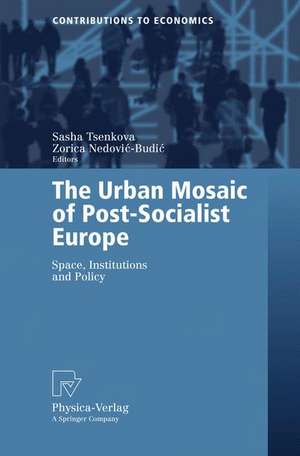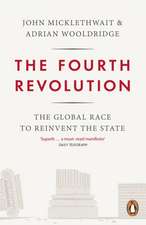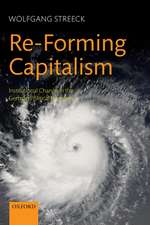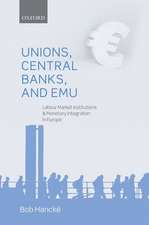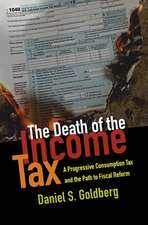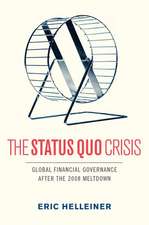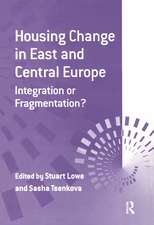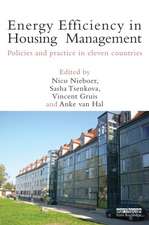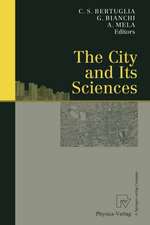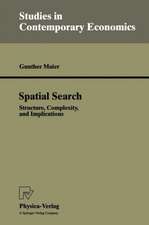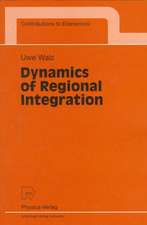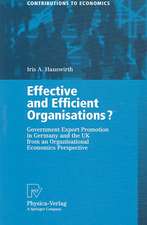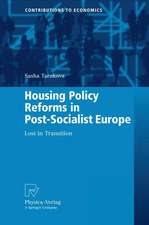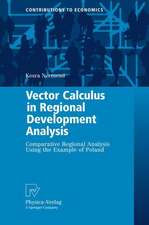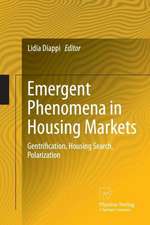The Urban Mosaic of Post-Socialist Europe: Space, Institutions and Policy: Contributions to Economics
Editat de Sasha Tsenkova, Zorica Nedovic-Budicen Limba Engleză Paperback – 6 sep 2006
Din seria Contributions to Economics
- 18%
 Preț: 1001.81 lei
Preț: 1001.81 lei -
 Preț: 90.83 lei
Preț: 90.83 lei - 15%
 Preț: 649.06 lei
Preț: 649.06 lei - 18%
 Preț: 1109.92 lei
Preț: 1109.92 lei - 24%
 Preț: 657.09 lei
Preț: 657.09 lei - 18%
 Preț: 976.54 lei
Preț: 976.54 lei - 17%
 Preț: 361.03 lei
Preț: 361.03 lei - 18%
 Preț: 1027.83 lei
Preț: 1027.83 lei -
 Preț: 283.93 lei
Preț: 283.93 lei - 15%
 Preț: 644.95 lei
Preț: 644.95 lei - 15%
 Preț: 638.24 lei
Preț: 638.24 lei -
 Preț: 394.29 lei
Preț: 394.29 lei - 15%
 Preț: 636.80 lei
Preț: 636.80 lei - 15%
 Preț: 637.78 lei
Preț: 637.78 lei - 18%
 Preț: 723.69 lei
Preț: 723.69 lei - 15%
 Preț: 635.47 lei
Preț: 635.47 lei - 15%
 Preț: 634.00 lei
Preț: 634.00 lei -
 Preț: 392.75 lei
Preț: 392.75 lei -
 Preț: 383.33 lei
Preț: 383.33 lei - 15%
 Preț: 637.28 lei
Preț: 637.28 lei - 15%
 Preț: 636.80 lei
Preț: 636.80 lei - 18%
 Preț: 950.96 lei
Preț: 950.96 lei - 15%
 Preț: 634.68 lei
Preț: 634.68 lei -
 Preț: 387.38 lei
Preț: 387.38 lei - 15%
 Preț: 647.27 lei
Preț: 647.27 lei - 15%
 Preț: 636.63 lei
Preț: 636.63 lei - 15%
 Preț: 639.73 lei
Preț: 639.73 lei -
 Preț: 385.62 lei
Preț: 385.62 lei - 15%
 Preț: 641.85 lei
Preț: 641.85 lei - 20%
 Preț: 649.60 lei
Preț: 649.60 lei - 15%
 Preț: 641.71 lei
Preț: 641.71 lei -
 Preț: 387.96 lei
Preț: 387.96 lei - 15%
 Preț: 645.47 lei
Preț: 645.47 lei -
 Preț: 385.08 lei
Preț: 385.08 lei - 15%
 Preț: 646.62 lei
Preț: 646.62 lei -
 Preț: 383.33 lei
Preț: 383.33 lei - 15%
 Preț: 638.43 lei
Preț: 638.43 lei -
 Preț: 381.21 lei
Preț: 381.21 lei - 15%
 Preț: 642.51 lei
Preț: 642.51 lei - 15%
 Preț: 637.78 lei
Preț: 637.78 lei - 15%
 Preț: 641.71 lei
Preț: 641.71 lei -
 Preț: 384.70 lei
Preț: 384.70 lei -
 Preț: 379.86 lei
Preț: 379.86 lei -
 Preț: 378.34 lei
Preț: 378.34 lei -
 Preț: 384.70 lei
Preț: 384.70 lei -
 Preț: 388.52 lei
Preț: 388.52 lei - 15%
 Preț: 641.71 lei
Preț: 641.71 lei -
 Preț: 381.00 lei
Preț: 381.00 lei - 15%
 Preț: 644.95 lei
Preț: 644.95 lei -
 Preț: 386.00 lei
Preț: 386.00 lei
Preț: 646.62 lei
Preț vechi: 760.73 lei
-15% Nou
Puncte Express: 970
Preț estimativ în valută:
123.77€ • 134.49$ • 104.03£
123.77€ • 134.49$ • 104.03£
Carte tipărită la comandă
Livrare economică 21 aprilie-05 mai
Preluare comenzi: 021 569.72.76
Specificații
ISBN-13: 9783790817263
ISBN-10: 3790817260
Pagini: 390
Ilustrații: IX, 390 p.
Dimensiuni: 155 x 235 x 30 mm
Greutate: 0.59 kg
Ediția:2006
Editura: Physica-Verlag HD
Colecția Physica
Seria Contributions to Economics
Locul publicării:Heidelberg, Germany
ISBN-10: 3790817260
Pagini: 390
Ilustrații: IX, 390 p.
Dimensiuni: 155 x 235 x 30 mm
Greutate: 0.59 kg
Ediția:2006
Editura: Physica-Verlag HD
Colecția Physica
Seria Contributions to Economics
Locul publicării:Heidelberg, Germany
Public țintă
Professional/practitionerCuprins
The Driving Forces of Post-Socialist Change.- The urban mosaic of post-socialist Europe.- Beyond transitions: Understanding urban change in post-socialist cities.- Institutional and spatial change.- Wall and mall: A metaphor for metamorphosis.- The spatial structures of Central and Eastern European cities.- Urban Processes and Spatial Change.- The changing spatial structure of post-socialist Sofia.- Spatial restructuring in post-socialist Budapest.- Poverty and inequality in Greater Tirana: The reality of peri-urban areas.- Urban Functions: Housing and Retail.- Urban housing markets in transition: New instruments to assist the poor.- Conquering the inner-city: Urban redevelopment and gentrification in Moscow.- The role of property rights reforms in Warsaw’s housing market.- The retail revolution in post-socialist Central Europe and its lessons.- Spatial imprints of urban consumption: large-scale retail development in Warsaw.- Urban Planning and Policy Responses.- Planning and societal context — The case of Belgrade, Serbia.- Entrepreneurial governance and the urban restructuring of a Slovakian town.- Urban redevelopment programmes in Kazan, Russia.- Urban policies and the politics of public space in Bucharest.- The post-socialist urban world.
Textul de pe ultima copertă
The book explores urban dynamics in post-socialist Europe 15 years after the fall of communism. The ‘urban mosaic’ metaphor expresses the complexity, diversity and uniqueness of the processes and spatial outcomes in post-socialist cities. The book examines the urban development and the policy and planning processes that have resulted from the socio-economic, political, and institutional transformations characterizing the move to markets and democracy. The emerging urban phenomena are illustrated with in-depth case studies, sensitive to historical themes, cultural issues and the socialist legacy. Cities featured in the book include: Kazan, St. Petersburg, Moscow, Warsaw, Prague, Komarno, Budapest, Belgrade, Bucharest, Sofia and Tirana. The edited volume is organized around the following four themes: the driving forces of post-socialist change; urban processes and spatial change; housing and retail sector transformation; and urban planning and policy responses.
"This volume provides an impressive overview of the dramatic transformations in the urban fabric and housing systems of post-socialist Europe". Larry S. Bourne, Professor of Geography and Planning, University of Toronto
"This text is a brave attempt to bring together a range of understandings of how urban systems are developing in post-socialist Europe, using both comparative data across countries and case studies of individual cities." Christine Whitehead, Professor of Economics, London School of Economics
"This volume provides an impressive overview of the dramatic transformations in the urban fabric and housing systems of post-socialist Europe". Larry S. Bourne, Professor of Geography and Planning, University of Toronto
"This text is a brave attempt to bring together a range of understandings of how urban systems are developing in post-socialist Europe, using both comparative data across countries and case studies of individual cities." Christine Whitehead, Professor of Economics, London School of Economics
